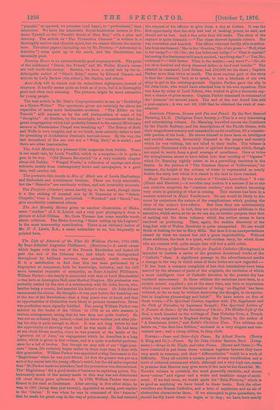The Life of Admiral of the Fleet Sir William Parker,
1781-1866. By Rear-Admiral Augustus Phillimore. (Harrison.)—A naval career which began with the war of the French Revolution and lasted till past the end of the Crimean war, and which was distinguished throughout by brilliant services, was certainly worth recording. It is a satisfaction to find that this has been performed by a biographer so competent, both for knowledge, industry, and the still more essential requisite of sympathy, as Rear-Admiral Phillimore. William Parker—the family is connected with that of Lord Macclesfield —was born at Annington Hall, near Market Drayton. His profession was probably settled by the fact of a relationship with Sir John Jervis, who, besides being a cousin, had married his father's sister. Sir John did not recommend the choice. He thought—it was just before the breaking-out of the war of the Revolution—that a long peace was at hand, and that no opportunities of distinction were likely to present themselves. Never was prediction more signally falsified. The young William Parker was entered on the books of the 'Orion' in 1793 as an able seaman (a curious arrangement, seeing that he was then not quite twelve). He was not an ordinary boy, indeed,—that his letter written just after join- ing his ship is quite enough to show. It was not long before he had the opportunity of showing what stuff he was made of. He had been at sea about fifteen months, when he was present at the battle of the "glorious 1st of June," an engagement which he describes in a long letter, which is given in this volume, and is a quite wonderful perform- ance for a lad of twelve. But though we may talk of our " high-pres- sure " times, life certainly began earlier in those days than it does with this generation. William Parker was appointed acting lieutenant to the Magicionne ' when he was just fifteen. At first the gunner was put as a sort of dry-nurse into the young officer's watch, but the old sailor reported that" 31r.Park or made no mistakes,"and the precaution was discontinued. The Magicienne ' did a good stroke of business in capturing prizes. Un- fortunately much of the money made in this way was not distributed till about thirty years afterwards. In 1799, William Parker was con- firmed in his rank as lieutenant. After serving in five other ships, he was, in 1801 (being then just twenty), appointed as acting post-captain to the Ossian.' It was when he was in command of the 'Amazon' that he made his great coup in the way of prize-money. He had resisted the request of his officers to give them a day at Lisbon. It was the first opportunity that the ship had had of making prizes, he said, and should not be lost. And a fine prize they did make. The story of the capture is quite dramatic :—" The chase showed Spanish colours. She was overtaken and boarded. The officer returned hardly able to articu- late from excitement. She is the Gravina,' Sir, of six guns.'—' Well,what is her cargo ?'—' Oh! Sir, she has hides and indigo That is capital!' but seeing the lieutenant still much excited, anything else ?'—' Yes, Sir; cochineal Still better. What is the matter,—any more ?'—' Sir, she has three hundred and thirty thousand dollars in hard cash besides.'" The admiral in command, Lord Nelson, had E10,000 for his share ; Captain Parker more than twice as much. The most curious part of the story is that the 'Amazon' had, so to speak, to ran a blockade of our own ships to get to the cruising-ground. Captain Parker gave the slip to Sir John Orde, who would have attached him to his own squadron. This was done by order of Lord Nelson, who wished to give a favourite cap- tain a chance of prize-money. Captain Parker remained in command of the Amazon' for several years. The end of the war found him still a post-captain ; it was not till 1830 that he obtained the rank of rear- admiral.


































 Previous page
Previous page